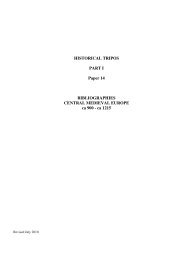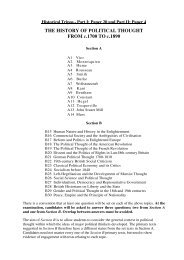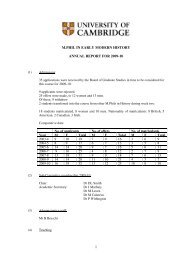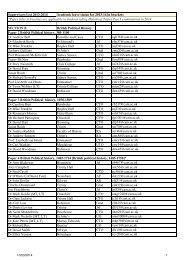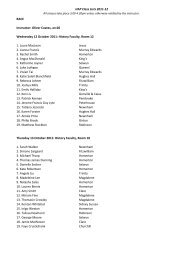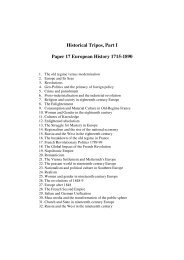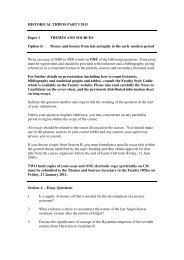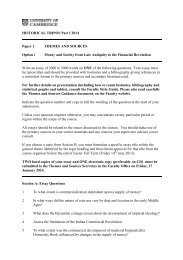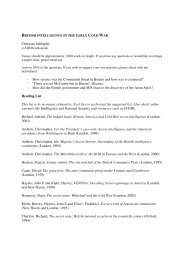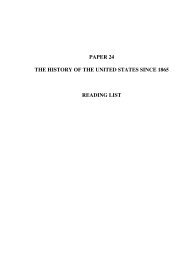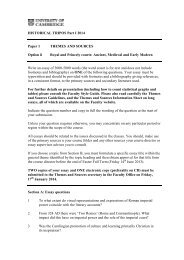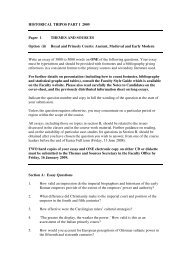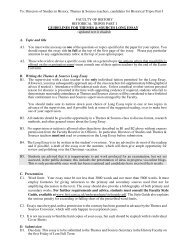Course Handbook - Faculty of History - University of Cambridge
Course Handbook - Faculty of History - University of Cambridge
Course Handbook - Faculty of History - University of Cambridge
Create successful ePaper yourself
Turn your PDF publications into a flip-book with our unique Google optimized e-Paper software.
Max Weber, The Protestant Ethic and the Spirit <strong>of</strong> Capitalism, trans. Talcott Parsons<br />
(Routledge, 2001).<br />
2) British industrialization in the eighteenth and nineteenth centuries<br />
Dr. S. Horrell and Dr. L. Shaw-Taylor<br />
The course considers the processes by which Britain became the first nation to overcome<br />
growth constraints and embark on a path <strong>of</strong> sustained expansion <strong>of</strong> per capita income. It<br />
looks at the roles played by increased investment and labour supply to industrial activities<br />
and changed incentives, which improved the efficiency <strong>of</strong> agriculture and promoted the<br />
development <strong>of</strong> industry. But it also emphasises the roles <strong>of</strong> country-specific institutions,<br />
such as property rights, and national cultures, such as inheritance patterns and work roles for<br />
men and women, in understanding Britain's `exceptionalism'. The course covers key debates<br />
both on the causes <strong>of</strong> industrialisation and the consequences for the people who lived<br />
through it. It looks at the following main topics:<br />
1. Industrialisation - overview and outline <strong>of</strong> main debates<br />
2. Agrarian change - enclosure, service in husbandry and rural class structure<br />
3. Agrarian change - new techniques and rising land productivity<br />
4. Revolution or evolution - trade, industry and growth<br />
5. Work and industrialisation - child labour and the emergence <strong>of</strong> the male<br />
breadwinner family<br />
6. The Poor Law and changes in the welfare system<br />
7. Industrialisation and the standard <strong>of</strong> living - qualitative assessments and<br />
quantification<br />
8. Industrialisation and women - implications for the measurement <strong>of</strong> welfare<br />
The aims <strong>of</strong> this course are to introduce students to the main debates, conceptual tools and<br />
empirical findings that are central to understanding British economic history during the<br />
Industrial Revolution.<br />
By the end <strong>of</strong> this course students should have acquired a good understanding <strong>of</strong> the key<br />
debates surrounding Britain's industrialisation and the welfare implications <strong>of</strong> the changes<br />
that occurred. They should be familiar with the various methodologies and data sources<br />
employed and have knowledge <strong>of</strong> recent empirical findings.<br />
3) Institutions and development (A course taught by the MPhil in Development Studies)<br />
Dr. S. Fennell<br />
The course looks at development processes through the lenses <strong>of</strong> a variety <strong>of</strong> institutional<br />
perspectives, ranging from the economic to the anthropological in disciplinary terms. The<br />
importance and implications <strong>of</strong> institutional analyses for development processes are<br />
identified by means <strong>of</strong> engaging with both traditional and new literatures on the role <strong>of</strong><br />
socio-political processes and their inter-relationships with economic activity. In the<br />
Michaelmas term the course will examine theoretical issues in the study <strong>of</strong> institutions using<br />
a range <strong>of</strong> disciplinary tools and illustrations <strong>of</strong> institutional success and failure from the<br />
twentieth century. In the Lent term the various competing models that have emerged in the<br />
new field <strong>of</strong> institutions are examined in the light <strong>of</strong> historical evidence on institutional<br />
performance and change. The lectures will be based on case studies and a policy analysis <strong>of</strong><br />
the different development experiences across a range <strong>of</strong> countries. The teaching in the<br />
Michaelmas term consists <strong>of</strong> one lecture and one class each week. In the Lent term, there is<br />
a schedule for both lectures and seminars. The seminars are designed to be small-group<br />
student presentations, which will allow a more free-ranging discussion <strong>of</strong> the topics covered<br />
in lectures over the two terms. There will be supervisions on key topics in weeks four and<br />
week eight <strong>of</strong> both Michaelmas and Lent terms. Supervisions will have the following<br />
format: Students will have a preliminary class with the supervisor after which they will be<br />
given a week to write a 2,000 word essay. The essays must be handed in on the scheduled<br />
date so that the supervisor has sufficient time to mark the work for the subsequent meeting<br />
with students in small groups (<strong>of</strong> five-six students) for a feedback session.<br />
10




